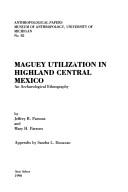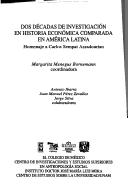| Listing 1 - 5 of 5 |
Sort by
|
Book
ISBN: 1949098907 Year: 1990 Publisher: Ann Arbor, Michigan : Museum of Anthropology, University of Michigan,
Abstract | Keywords | Export | Availability | Bookmark
 Loading...
Loading...Choose an application
- Reference Manager
- EndNote
- RefWorks (Direct export to RefWorks)
Indians of Mexico --- Agave products industry --- Industries. --- Antiquities. --- Mexico, Valley of (Mexico) --- Mexico
Book
ISBN: 906809114X Year: 1990 Publisher: Amsterdam Koninklijk Nederlands Aardrijkskundig Genootschap
Abstract | Keywords | Export | Availability | Bookmark
 Loading...
Loading...Choose an application
- Reference Manager
- EndNote
- RefWorks (Direct export to RefWorks)
Basket making --- Mescal industry --- Rural development --- Rural industries --- Industrialization, Rural --- Rural industrialization --- Rural industry --- Industries --- Community development, Rural --- Development, Rural --- Integrated rural development --- Regional development --- Rehabilitation, Rural --- Rural community development --- Rural economic development --- Agriculture and state --- Community development --- Economic development --- Regional planning --- Agave products industry --- Liquor industry --- Basketmaking --- Basketry --- Osiers --- Weaving --- Raffia work --- Case studies --- Citizen participation --- Social aspects --- Economic production --- Economic geography --- Mexico

ISBN: 0915703203 9780915703203 Year: 1990 Volume: 82 Publisher: Ann Arbor University of Michigan. Museum of anthropology
Abstract | Keywords | Export | Availability | Bookmark
 Loading...
Loading...Choose an application
- Reference Manager
- EndNote
- RefWorks (Direct export to RefWorks)
Agave products industry --- Indians of Mexico --- Produits de l'agave --- Indiens d'Amérique --- Antiquities --- Industries --- Industrie --- Antiquités --- Mexico --- Mexico, Valley of (Mexico) --- Mexique --- Mexico, Vallée de (Mexique) --- -Indians of Mexico --- Indians of North America --- Indigenous peoples --- Meso-America --- Meso-American Indians --- Mesoamerica --- Mesoamerican Indians --- Pre-Columbian Indians --- Precolumbian Indians --- Ethnology --- Plant products industry --- -Antiquities --- -Valley of Mexico (Mexico) --- Antiquities. --- -Industries --- -Antiquities. --- Indiens d'Amérique --- Antiquités --- Mexico, Vallée de (Mexique) --- Valley of Mexico (Mexico) --- Anáhuac (Mexico : Valley of Mexico) --- Anauac (Mexico : Valley of Mexico) --- Basin of México (Mexico) --- Cuenca de México (Mexico) --- Mexico, Basin of (Mexico) --- Valle de México (Mexico) --- Indians of Mexico - Industries - Mexico - Mexico, Valley of --- Agave products industry - Mexico - Mexico, Valley of --- Indians of Mexico - Mexico - Mexico, Valley of - Antiquities --- Mexico, Valley of (Mexico) - Antiquities --- Mexico - Antiquities

ISBN: 9681208579 6075640789 Year: 1999 Publisher: México, D.F. El Colegio de México
Abstract | Keywords | Export | Availability | Bookmark
 Loading...
Loading...Choose an application
- Reference Manager
- EndNote
- RefWorks (Direct export to RefWorks)
La industria del henequén en Yucatán, pero sobre todo las manos desfibradoras, la transición de campesino a obrero, es el tema que ocupa al presente ensayo. El autor nos plantea el estudio de la identidad como marco conceptual. Ideas, símbolos y valores, el hacer y el saber; partes fundamentales de esa identidad de origen, que es ampliada cuando a esto se aunan lenguas, tradiciones, ceremonias.
Sociology of work --- Yucatán --- Indians --- Mineral industries --- History. --- Latin America --- Commerce --- Economic conditions. --- Henequen industry --- Group identity --- Employees. --- Collective identity --- Community identity --- Cultural identity --- Social identity --- Identity (Psychology) --- Social psychology --- Collective memory --- Agave products industry --- Plant fiber industry --- Extractive industries --- Extractive industry --- Metal industries --- Mines and mining --- Mining --- Mining industry --- Mining industry and finance --- Industries --- Asociación Latinoamericana de Libre Comercio countries --- Neotropical region --- Neotropics --- New World tropics --- Spanish America --- Social, group or collective psychology
Book
ISBN: 9780520962583 0520962583 9780520281042 0520281047 9780520281059 0520281055 Year: 2015 Publisher: Oakland, Calif. University of California Press
Abstract | Keywords | Export | Availability | Bookmark
 Loading...
Loading...Choose an application
- Reference Manager
- EndNote
- RefWorks (Direct export to RefWorks)
Divided Spirits tells the stories of tequila and mezcal, two of Mexico's most iconic products. In doing so, the book illustrates how neoliberalism influences the production, branding, and regulation of local foods and drinks. It also challenges the strategy of relying on "alternative" markets to protect food cultures and rural livelihoods. In recent years, as consumers increasingly demand to connect with the people and places that produce their food, the concept of terroir-the taste of place-has become more and more prominent. Tequila and mezcal are both protected by denominations of origin (DOs), legal designations that aim to guarantee a product's authenticity based on its link to terroir. Advocates argue that the DOs expand market opportunities, protect cultural heritage, and ensure the reputation of Mexico's national spirits. Yet this book shows how the institutions that are supposed to guard "the legacy of all Mexicans" often fail those who are most in need of protection: the small producers, agave farmers, and other workers who have been making tequila and mezcal for generations. The consequences-for the quality and taste of tequila and mezcal, and for communities throughout Mexico-are stark. Divided Spirits suggests that we must move beyond market-based models if we want to safeguard local products and the people who make them. Instead, we need systems of production, consumption, and oversight that are more democratic, more inclusive, and more participatory. Lasting change is unlikely without the involvement of the state and a sustained commitment to addressing inequality and supporting rural development.
Mescal --- Mescal industry --- Agave products industry --- Liquor industry --- Mezcal --- Liquors --- Pulque --- E-books --- Mescal industry. --- Mescal. --- Production management --- Biotechnology --- Mexico --- agave tequila. --- agave. --- alcohol branding. --- alcohol industry. --- alcohol production. --- booze. --- branding liquor. --- denominations of origin. --- food and agriculture. --- history of mezcal. --- history of tequila. --- liquor production. --- local food movement. --- local spirits. --- making tequila. --- mexican liquor. --- mexican mezcal. --- mexican tequila. --- mexicos national spirits. --- mezcal or tequila. --- mezcal. --- production of mezcal. --- production of tequila. --- protected food branding. --- small tequila producers. --- taste of place. --- tequila. --- terroir. --- wine and spirits.
| Listing 1 - 5 of 5 |
Sort by
|

 Search
Search Feedback
Feedback About UniCat
About UniCat  Help
Help News
News